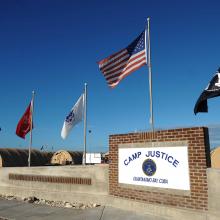Al-Qaeda
“Dutch values are based on Christianity, on Judaism, on humanism. Islam and freedom are not compatible,” populist politician Geert Wilders, 53, said in an interview with USA Today. “You see it in almost every country where it dominates. There is a total lack of freedom, civil society, rule of law, middle class; journalists, gays, apostates — they are all in trouble in those places. And we import it.”
The arrests of six Minnesota men accused earlier this month of attempting to join the Islamic State group highlights an unprecedented marketing effort being waged by the militant group in Iraq and Syria, U.S. law enforcement officials and terror analysts said.
It’s a campaign that is finding resonance from urban metros to the American heartland.
“This is not so much a recruitment effort as it is a global marketing campaign, beyond anything that al-Qaida has ever done,” said a senior law enforcement official.
The official, who is not authorized to comment publicly, said the Islamic State’s slick multimedia productions, its use of social media, and personal “peer-to-peer” communication are proving to be effective parts of a sophisticated program aimed at the West.
“I don’t think there has been one case in which we haven’t found some connection to the videos or other media the group has produced,” the official said.
Federal authorities have identified more than 150 U.S. residents who have sought to join the ranks of the terror organization or rival groups in Syria. There is evidence that about 40 of those have traveled to the region and returned to the U.S. Most have been charged; an undisclosed number are free and subjects of intense surveillance, the senior official said.
The smallest subset of the group, an estimated dozen, represents those who have actually joined the fighting ranks.
Sitting under a veranda at the former headquarters of Somali Airlines, Ali Bashir sipped coffee and chewed khat, an African herb, as he recounted 15 years of anarchy fomented by al-Shabab Islamic terrorists.
“Life is very hard here,” he lamented.
“There’s nothing to eat and nowhere to work. But the rebels will come and still ask you for money.”
Since Somalia’s central government collapsed in the early 1990s, al-Shabab has emerged as the greatest threat to international efforts to rebuild the east African nation. The al-Qaida-linked militants extort, kidnap, stage terror attacks, and control remote areas of the countryside.
Al-Shabab gained renewed global attention last week, when a small band of militants massacred 148 people at Garissa University College in neighboring Kenya, where they singled out Christians for execution. In 2013, al-Shabab terrorists attacked the Westgate Mall in Nairobi, Kenya, murdering nearly 70.
In the wake of this month’s attack, Somalia President Hassan Sheikh Mohamud called for more cooperation between Kenya and Somalia to eliminate al-Shabab, and Kenyan jets pounded two al-Shabab camps in Somalia.
Bashir, 28, who sold clothing before fleeing here, doubted the Somali government could do much about the terrorist group. He fled to the capital here a few years ago after al-Shabab seized control of a region in the south. He now lives in the old airlines headquarters with 1,000 other families.
“I have grown up in this country without knowing peace or stability,” said Bashir, a father of six.
Is the Islamic State — ISIS or ISIL — different from other Islamist terror groups? If so, is the difference one of substance or simply degree? Or is there any real difference at all?
The question preoccupies the best intelligence professionals and academic students of the Arab Muslim world, but so far has produced more confusion than certainty about what we’re witnessing.
Maybe we’re too close. Maybe we’d gain perspective by going back in time — to 1993, say, and an article by a Harvard history professor, Samuel Huntington, in the magazine Foreign Affairs and later in a book titled The Clash of Civilizations.
Huntington saw a grim future and a different kind of war. While nation-states remain principal players in world affairs, he wrote, the great conflicts of the future will be between “different civilizations.”
“The clash of civilizations will dominate global politics,” he wrote. “The fault lines between civilizations will be the battle lines of the future.”
After my article on the terrorism in Paris last week, readers offered some thoughtful critiques of my position. Their comments zero in on the difficulty inherent in sorting out responsibility for violence without blaming victims or excusing perpetrators. My effort, however flawed, in analyzing this instance of violence had one goal in mind: to discredit our methods for justifying violence. What seems to have elicited the most concern is my use of the image of a dragon to discuss René Girard’s concept of the sacred. I pointed out that the editors at Charles Hebdo unapologetically embraced radical secularism. They believed that sacred structures are not only as dead as a mythical dragon, but that they have no function in modern society. I begged to differ, not because I am a fan of the archaic sacred, as Girard calls it, but because I am extremely concerned that continuing to remain ignorant of the way it functions in modern society is the greatest global threat we face today. Here are four things you need to know about the relationship between the archaic sacred and violence and how that relationship threatens our world:
1. Categorical Confusion
The archaic sacred is also called the false sacred because it generates a world in which false differences appear to be true. We see this dynamic clearly in the actions of terrorists who believe in a false difference between legitimate targets for violence (Western secularists, for example) and victims of violence who must be avenged (their religious and national compatriots). We easily condemn them for justifying their own violence with self-righteous fervor. Trying to expose the difference humans have constructed as categorical lies is the driving force behind our work at the Raven Foundation.
Let me be clear: No human being is a legitimate target for violence, period. To say otherwise is indeed to blame the victim and excuse perpetrators. However, to defend victims of violence by glorifying their deaths or sanctifying the values that apparently got them murdered is to play into the hands of the archaic sacred. Why? Because by explaining why these victims did not deserve to die, we indirectly acknowledge the possibility that some victims might indeed deserve what they get. In other words, the victims of the Paris terrorism are not to be mourned because they were good, noble, or saintly people. It wouldn’t matter if they were liars, cheats, and murderers – no one needs to earn the right to NOT be murdered. To hang on to the difference between those who deserve to die and those who don’t is to hang on in confusion to a false difference that serves only one purpose – to sanctify violence and ensure its continued presence as a plague in our world.
The myth that President Barack Obama closed Guantanamo his first year in office persists, but four years later the detainees are still there. Can justice be served?
I wanted to find out for myself. Over the past month, the Obama administration has started prosecuting some of the Guantanamo prisoners. They are tried in a specially constructed courtroom at Guantanamo, under military commissions rules touted to restore the rights absent under former President George W. Bush’s tribunals.
The trial logistics are a challenge: the tribunals convene periodically on the Guantanamo naval base under tightly controlled conditions. Additionally, the hearings are simulcast to military bases in the U.S. where members of the public and press are allowed to view.
I went to the Ft. Meade army base in Maryland to view the proceedings via closed circuit TV. While I was there, Khalid Sheikh Mohammad, alleged ringleader in the September 11, 2001, attacks, and four other men charged with various crimes related to 9/11, were on trial. The government is asking for the death penalty for all five men.
My children don't remember.
I mean, the younger children in my church don't remember. It was eleven years ago. The oldest of them was six when the towers were destroyed and we went to war. I'm wondering how I talk to them about it. I wonder how I tell them the story without subjecting them to the trauma so many people experienced that day.
So, no video footage. No point in giving the kids nightmares. I'm just going to talk about how many kinds of religions there are in the United States. No longer simply a liberal posture, it's an issue of national security, no? If we want to be at peace with our neighbors locally and globally, we need to understand them. We need to have something to work with, some kind of conecpt of how they live.
From Mother Jones this morning:
White House Counterterrorism adviser John Brennan officially acknowledged the administration's targeted killing of Al Qaeda members abroad for the first time in a speech on Monday. But Brennan didn't tell the whole story: He largely rehashed the legal rationale for targeted killings of specific Al Qaeda suspects, instead of defending the use of more controversial "signature strikes," in which targets are selected based on a "pattern of behavior."
Read the full story here
Politics And Prayers; Senate Passes Insider-Trading Bill; What Childhood Poverty Means (OPINION); Nation-Building Vs. Al-Qaeda-Crushing In Afghanistan; Should All Americans Have To Earn Their Citizenship?; That Former Slave Who Wrote His Ex-Master Never Went Back To Him; NC's Heath Shuler Won't Seek Re-Election To House; Syria: It’s Not Just About Freedom (OPINION); Jobs Report: Unemployment Rate For Returning Veterans Fell 6 Percentage Points.
 Coinciding with the visit of a dear friend who's spent the past few years working in Afghanistan for both development NGOs and (non-U.S.) government agencies, the DVD of Charlie Wilson's War recently arrived from Netflix. My friend recommends it. Also, I [heart] Philip Seymour Hoffman. And I can tolerate Tom Hanks in appropriate doses. But an
Coinciding with the visit of a dear friend who's spent the past few years working in Afghanistan for both development NGOs and (non-U.S.) government agencies, the DVD of Charlie Wilson's War recently arrived from Netflix. My friend recommends it. Also, I [heart] Philip Seymour Hoffman. And I can tolerate Tom Hanks in appropriate doses. But an







